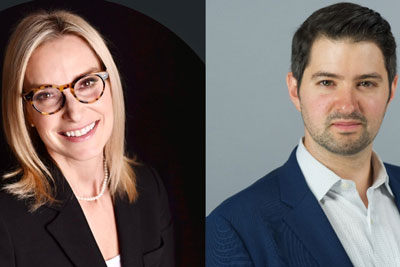Andi Wolfer and Aaron Kaplowitz brought global learning to life in 'Innovation Nation, The Global Influence of Israeli Technology and Entrepreneurship.’
What does global learning look like in a course on innovation and entrepreneurship?
Recently, I sat down with FIU Honors College faculty members, Andi Wolfer and Aaron Kaplowitz, to ask just that.
In their ‘Innovation Nation, The Global Influence of Israeli Technology and Entrepreneurship’ course in Fall 2021, Wolfer and Kaplowitz had two overarching goals for students. First, Kaplowitz shared, was to “bring students global awareness of what’s happening in Israel,” in terms of “the outsized impact Israeli Startups are having on the global economy.” And second, was to give students a “multifaceted perspective on what’s happening.” So, they brought guest speakers into class virtually.
Kaplowitz described these speakers as “genuine experts in their respective fields.” Some of them were “early entrepreneurs, some were in government, some were local entrepreneurs or government leaders who were impacted by Israeli technology in one way or another. So they were able to give the students a very insightful look at what’s happening and to talk about their specific situations. "We brought in the CEO of a company that is creating a pill for insulin delivery. We brought in a nonprofit that brings water and solar technology to Africa. We brought in a local CEO of a company that does robotic surgeries. We’re just trying to give them [the students] exposure to a lot of things that are happening out there that are changing our world and hear directly from those who are leading the way.”
Both Kaplowitz and Wolfer reflected on how this time of COVID has opened up new avenues to include the perspectives of professionals in the field who, two years ago, they wouldn’t have dreamed of being able to invite to present in their face-to-face class space. In her reflection, Wolfer described how they tapped into the expertise of speakers from both For- and Not-For-Profit organizations. “We had a Not-For-Profit organization, called Innovation Africa, explain how they bring water to cities in Africa and they really do incredible, incredible work. And I think some of our students were almost moved to tears. They [the student groups] already had their Startup ideas, but none of them had a social impact component to it. And something that shouldn't be shocking, but it was pleasantly shocking, I think they thought after they heard this speaker, “Wow! We never even thought to include a social impact component in our Startups.” And the wheels started to turn. “Maybe we'll donate a portion of our sales to X. Or, how can we help the communities with our products?” And it was kind of fascinating to see how it clicked right away, after hearing the speaker, that maybe their companies can do good for their communities.”
How do students go from knowing very little to being ambassadors for Israel?
Students had been tasked with collaborating in groups of three to “come up with their own Startup ideas. For this, they had to “put their Israeli hats on, engage in a global issue, and try to come up with a solution for it,” said Kaplowitz.
So, on the first day of class students were asked to share their own ideas about ‘Israel.’ Their initial associations represented typical stereotypes about the region: tension, war, history. But by the end of the course, Wolfer says, “these 11 students are essentially ambassadors for Israel walking around Miami who could give you a much wider range of what, actually, Israel means to them and what’s going on currently in their tech scene; what’s happening in Jerusalem, what’s happening in Tel Aviv. They could actually identify where it is on the map and who their neighbors are.”
Would you share that particular story with me again?
I remembered an early morning phone call I’d received from Andi at the end of the fall semester, in which she shared an enthusiastic account of their students’ learning. I asked her to share one particular story with me again.
“She was a lovely student and was incredibly reserved at the beginning of class and not so much willing to raise her hand, even though she had fantastic answers and was incredibly thoughtful,” shared Wolfer. “She had expressed to Aaron and me that this [entrepreneurship] was an area where she didn't feel comfortable. Then, we had a site visit to Wix and on the spot the students had to do a pitch for their Startup ideas. Which I didn't know was happening and neither did they. And to our surprise, she volunteered and was one of the first to pitch her Startup. Not only was she fantastic, she nailed it! I think it was one of the best pitches that Wix had heard. And her sense of growth throughout the semester and accomplishment—you could just see it; she was beaming. And it was, as a professor, it was amazing. As just another individual watching someone grow, it was fantastic! And I guess most importantly, she was incredibly proud.”
What drew students to this course?
When I speculated about what had drawn students to take this course, Kaplowitz had this to say. “Look, I think honestly a lot of our students came into class not really knowing what to expect. I'm not sure they had given much thought to Israel. It wasn't because the title was that great. I don't know. But I think we watched a few of the students really embrace some of the possibilities that are out there. You know, this is a very tech entrepreneurship focused class, but we had students who want to be lawyers, students who are going to be accountants and doctors, and not necessarily the next Elon Musk. Although I think we may have one of those. And each one of them was able to understand that, no matter what field they're in, there's a way that technology and innovation can play a role. So from my perspective, I think a lot of these students were surprised by what is possible for them. And we saw a lot of growth on that.”
What can we learn from Israel, in terms of global learning or social impact?
“I think from my [Kaplowitz’s] perspective, the biggest lesson from Israel's approach to this is that failure is okay. In many ways it's celebrated. Which I think is a very different approach and mentality than we have in the US. If you work on a Startup in Israel and it fails, you're actually more likely to get a job in your next Startup because they value the lessons you’ve learned from the failure. It is a totally different mentality and as long as we can, maybe, pull from that, from Israel and its approach, we will all be better off.”
Israel’s approach to immigration is another big takeaway, and it’s a topic that became a theme in their class. Wolfer explained, “I would say that Israeli companies really seek to embrace immigrants because they bring a lot to the table. And I don't actually think our students [who are immigrants] even recognize how brave they are.”
Kaplowitz then tied these two ideas together. “Israel is very much an immigrant country, and part of the reason why a lot of people think Israel is so successful in its Startup culture is that immigrants are risk takers. So, if you're a risk taker, it sort of ties into the failure part; it goes hand in hand. People are trying new things and trying to really disrupt the world in a good way. Immigrants have a lot to bring there because, you know, to move from one place to another, already you're way ahead of most people in the world, in terms of risk taking. And then, to make it in a new society you have to think about all the things that are required to get ahead. So, the risk taking is a really big lesson, we believe, in why the Israeli Startup culture is so strong.”
What's on the horizon?
When I asked what’s on the horizon for these two faculty members, Kaplowitz said, “We think that what's happening in Miami and in Florida now is really well aligned with what Israel is looking to do. As far as helping Miami get to the next place, wherever that might be with all this future technology, and as we think ahead with what we’re doing at FIU, we’re trying to bridge the hiring needs of these Israeli companies with the job needs of students coming out of college.”
The Student Experience

Here's Valentina Salazar's summary of her experience as a student in 'Innovation Nation, The Global Influence of Israeli Technology and Entrepreneurship.' "This course brought live global aspects into the classroom. Professors Wolfer and Kaplowitz invited business leaders of Israeli companies, who were fulfilling their goal of impacting the world through innovation, to the class throughout the semester. These guest speakers had different cultures, backgrounds, and experiences in leading the development of revolutionary technology and innovation in different parts of the word in areas of medicine, technology, and industry. This exposed me to unique global learning opportunities, such as learning from companies like Oravax, Innovation Africa, and INSIGHTEC, that solve current global problems. Personally, this course challenged me to learn skills and grow in confidence to contribute my innovation to society."

